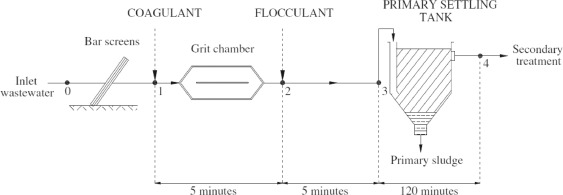当前位置:
X-MOL 学术
›
Prog. Energy Combust. Sci.
›
论文详情
Our official English website, www.x-mol.net, welcomes your
feedback! (Note: you will need to create a separate account there.)
Towards sustainable and energy efficient municipal wastewater treatment by up-concentration of organics
Progress in Energy and Combustion Science ( IF 32.0 ) Pub Date : 2019-01-01 , DOI: 10.1016/j.pecs.2018.10.002 Huseyin Guven , Recep Kaan Dereli , Hale Ozgun , Mustafa Evren Ersahin , Izzet Ozturk
Progress in Energy and Combustion Science ( IF 32.0 ) Pub Date : 2019-01-01 , DOI: 10.1016/j.pecs.2018.10.002 Huseyin Guven , Recep Kaan Dereli , Hale Ozgun , Mustafa Evren Ersahin , Izzet Ozturk

|
Abstract In the last decades, energy scarcity has become an important issue globally. Renewable energy sources have gained importance due to limited fossil fuel reserves and increased concerns on climate change. In this regard, municipal wastewater is a remarkable energy source since huge amounts of wastewater are generated and treated all over the world every day. Conventional activated sludge (CAS) process, which has been in use for more than a century, is the most widely applied treatment method for municipal wastewater. In spite of its reliability and proven success, CAS process suffers from intensive energy requirement and lack of capability to capture a high amount of organic matter from wastewater. In order to recover the energy present in wastewater efficiently, it is crucial to up-concentrate the organics in wastewaters. Several physicochemical and biological processes may be employed for up-concentration of organics and capturing them onto sludge. Capturing of organic matter in sludge phase allows improved energy recovery through anaerobic digestion. This study aims to present a comprehensive evaluation of the current practices applied to up-concentrate organic matter in municipal wastewater. The paper discusses the most frequently used up-concentration methods by addressing lab-scale and full-scale applications with typical operational parameters as well as providing their strengths and constraints. In addition, various up-to-date treatment configurations are introduced in order to provide a future perspective in this field.
中文翻译:

通过提高有机物浓度实现可持续和节能的城市污水处理
摘要 在过去的几十年里,能源稀缺已成为全球的一个重要问题。由于化石燃料储备有限和对气候变化的日益关注,可再生能源变得越来越重要。在这方面,城市污水是一种非凡的能源,因为全世界每天都会产生和处理大量污水。传统活性污泥(CAS)工艺已经使用了一个多世纪,是应用最广泛的城市污水处理方法。尽管 CAS 工艺可靠且成功,但其能源需求量大且缺乏从废水中捕获大量有机物的能力。为了有效地回收废水中存在的能量,提高废水中的有机物浓度至关重要。可以采用几种物理化学和生物过程来提高有机物的浓度并将其捕获到污泥中。捕获污泥相中的有机物可以通过厌氧消化改善能量回收。本研究旨在全面评估当前应用于提高城市废水中有机物浓度的做法。本文通过解决具有典型操作参数的实验室规模和全规模应用以及提供它们的优势和限制,讨论了最常用的上浓缩方法。此外,还介绍了各种最新的处理配置,以提供该领域的未来前景。捕获污泥相中的有机物可以通过厌氧消化改善能量回收。本研究旨在全面评估当前应用于提高城市废水中有机物浓度的做法。本文通过解决具有典型操作参数的实验室规模和全规模应用以及提供它们的优势和限制,讨论了最常用的上浓缩方法。此外,还介绍了各种最新的处理配置,以提供该领域的未来前景。捕获污泥相中的有机物可以通过厌氧消化改善能量回收。本研究旨在全面评估当前应用于提高城市废水中有机物浓度的做法。本文通过解决具有典型操作参数的实验室规模和全规模应用以及提供它们的优势和限制,讨论了最常用的上浓缩方法。此外,还介绍了各种最新的处理配置,以提供该领域的未来前景。本文通过解决具有典型操作参数的实验室规模和全规模应用以及提供它们的优势和限制,讨论了最常用的上浓缩方法。此外,还介绍了各种最新的处理配置,以提供该领域的未来前景。本文通过解决具有典型操作参数的实验室规模和全规模应用以及提供它们的优势和限制,讨论了最常用的上浓缩方法。此外,还介绍了各种最新的处理配置,以提供该领域的未来前景。
更新日期:2019-01-01
中文翻译:

通过提高有机物浓度实现可持续和节能的城市污水处理
摘要 在过去的几十年里,能源稀缺已成为全球的一个重要问题。由于化石燃料储备有限和对气候变化的日益关注,可再生能源变得越来越重要。在这方面,城市污水是一种非凡的能源,因为全世界每天都会产生和处理大量污水。传统活性污泥(CAS)工艺已经使用了一个多世纪,是应用最广泛的城市污水处理方法。尽管 CAS 工艺可靠且成功,但其能源需求量大且缺乏从废水中捕获大量有机物的能力。为了有效地回收废水中存在的能量,提高废水中的有机物浓度至关重要。可以采用几种物理化学和生物过程来提高有机物的浓度并将其捕获到污泥中。捕获污泥相中的有机物可以通过厌氧消化改善能量回收。本研究旨在全面评估当前应用于提高城市废水中有机物浓度的做法。本文通过解决具有典型操作参数的实验室规模和全规模应用以及提供它们的优势和限制,讨论了最常用的上浓缩方法。此外,还介绍了各种最新的处理配置,以提供该领域的未来前景。捕获污泥相中的有机物可以通过厌氧消化改善能量回收。本研究旨在全面评估当前应用于提高城市废水中有机物浓度的做法。本文通过解决具有典型操作参数的实验室规模和全规模应用以及提供它们的优势和限制,讨论了最常用的上浓缩方法。此外,还介绍了各种最新的处理配置,以提供该领域的未来前景。捕获污泥相中的有机物可以通过厌氧消化改善能量回收。本研究旨在全面评估当前应用于提高城市废水中有机物浓度的做法。本文通过解决具有典型操作参数的实验室规模和全规模应用以及提供它们的优势和限制,讨论了最常用的上浓缩方法。此外,还介绍了各种最新的处理配置,以提供该领域的未来前景。本文通过解决具有典型操作参数的实验室规模和全规模应用以及提供它们的优势和限制,讨论了最常用的上浓缩方法。此外,还介绍了各种最新的处理配置,以提供该领域的未来前景。本文通过解决具有典型操作参数的实验室规模和全规模应用以及提供它们的优势和限制,讨论了最常用的上浓缩方法。此外,还介绍了各种最新的处理配置,以提供该领域的未来前景。











































 京公网安备 11010802027423号
京公网安备 11010802027423号